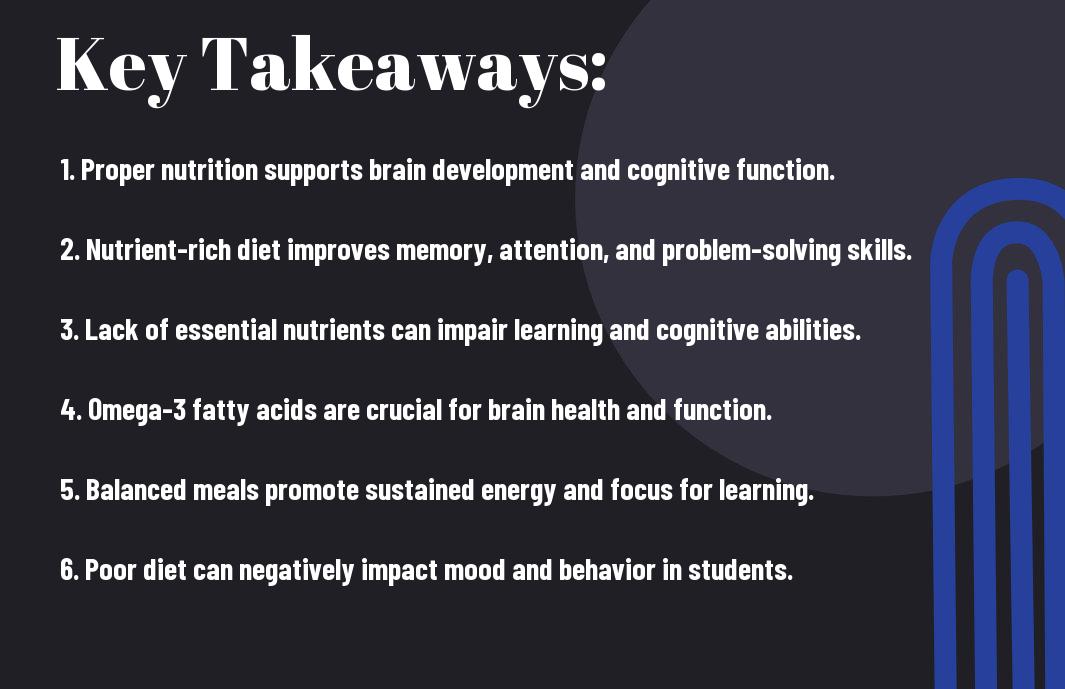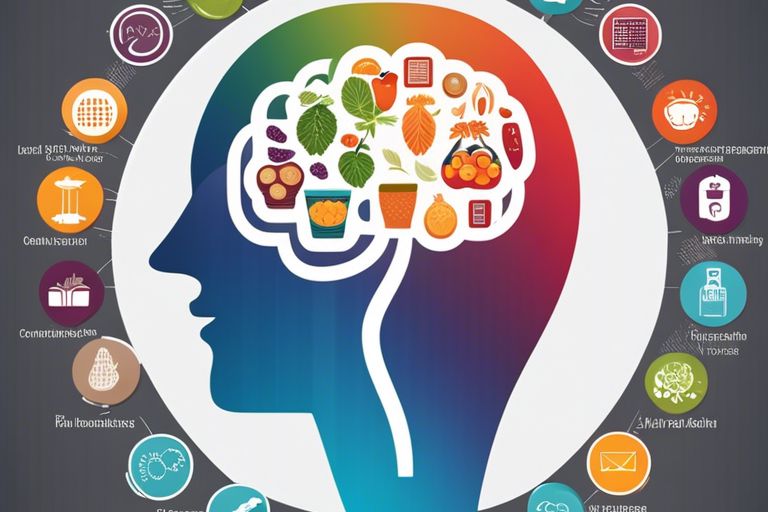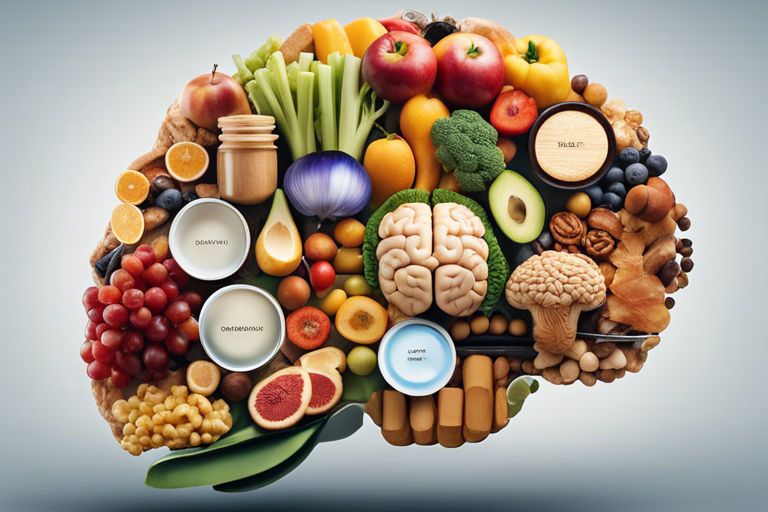Cognition, the mental process of acquiring knowledge and understanding through thought, experience, and the senses, is heavily influenced by nutrition. It is no secret that the foods we consume impact various aspects of our health, but the link between nutrition and cognitive function is often overlooked. Consuming nutrient-dense foods is crucial for maintaining optimal brain health and maximizing learning potential. In this blog post, we will explore the significant role that nutrition plays in cognitive function and learning, and how certain dietary choices can either enhance or hinder our mental capabilities.
Key Takeaways:
- Nutrition is crucial for cognitive function and learning: Proper nutrition is essential for brain health and function, as it provides the necessary nutrients for cognitive development, memory, and learning abilities.
- Healthy eating habits can positively impact academic performance: A balanced diet, including nutrients such as omega-3 fatty acids, antioxidants, and vitamins, can improve attention, concentration, and problem-solving skills, leading to better academic performance.
- Poor nutrition can impair cognitive function: Inadequate intake of essential nutrients can lead to cognitive impairment, decreased attention span, and reduced ability to retain and process information, ultimately affecting learning and overall cognitive function.

Nutrient Essentials for Cognitive Health
Some nutrients are essential for maintaining cognitive function and promoting healthy learning. It is important to understand the role of macronutrients and micronutrients in supporting brain health.
Macronutrients: Proteins, Fats, and Carbohydrates
The macronutrients play a crucial role in providing the necessary energy for optimal brain function. Proteins are essential for neurotransmitter production, which is crucial for learning and memory. Fats, particularly omega-3 fatty acids, are important for brain development and function, while carbohydrates are the primary fuel for the brain, providing the energy needed for cognitive processes.
Micronutrients: Vitamins and Minerals
With micronutrients, vitamins and minerals play a key role in supporting cognitive health. B vitamins, particularly B6, B12, and folic acid, are essential for neurotransmitter synthesis and maintenance of cognitive function. Minerals such as iron, zinc, and magnesium are also important for brain development and function.
Macronutrients provide the energy needed for brain function, while micronutrients play a vital role in supporting cognitive processes and maintaining brain health.
Dietary Patterns and Cognitive Outcomes
Unlike physical exercise, which is often seen as a way to improve cognitive function and learning, the role of nutrition in brain health is sometimes overlooked. However, research has shown that the types of foods we consume can have a significant impact on our cognitive abilities and overall brain function.
The Mediterranean Diet and Brain Function
Brain function can be greatly influenced by the type of diet individuals follow. The Mediterranean diet, which is rich in fruits, vegetables, whole grains, and healthy fats such as olive oil and nuts, has been associated with improved cognitive function and reduced risk of cognitive decline in older adults. This diet is also high in antioxidants and anti-inflammatory nutrients, which play a crucial role in maintaining brain health and function.
The Mediterranean diet has been linked to improved memory, attention, and a reduced risk of developing dementia. Research has shown that adherence to this dietary pattern is associated with larger brain volume and better cognitive performance, making it a promising approach for promoting brain health and cognitive function.
Impact of Western Diet on Learning and Memory
Dietary habits characterized by high consumption of processed foods, red meat, sugary drinks, and unhealthy fats, commonly known as the Western diet, have been associated with negative effects on learning and memory. Consuming these types of foods can lead to increased inflammation, oxidative stress, and impaired synaptic plasticity, all of which can have a detrimental impact on brain function and cognitive abilities.
Cognitive function can be compromised as a result of following a Western diet, with studies linking this dietary pattern to a higher risk of cognitive decline, poor memory, and impaired learning abilities. These findings underscore the importance of adopting a more balanced and nutritious diet to support optimal brain health and cognitive function.
Nutritional Interventions for Enhanced Cognition
Keep in mind that nutrition plays a pivotal role in cognitive function and learning, and making positive changes to your diet can greatly impact your mental abilities. Several nutritional interventions have been shown to enhance cognition and improve learning, offering promising avenues for individuals looking to optimize their brain health.
Role of Antioxidants in Neuroprotection
An essential aspect of nutritional interventions for enhanced cognition is the role of antioxidants in neuroprotection. Antioxidants are crucial for combating oxidative stress and reducing the risk of neurological disorders, ultimately promoting better cognitive function and learning. Consuming a diet rich in antioxidant-rich foods such as berries, dark leafy greens, and nuts can provide the brain with the necessary protection against oxidative damage, improving overall brain health and cognitive performance.
Probiotics and Gut-Brain Axis in Learning
The gut-brain axis plays a significant role in learning and cognitive function, and probiotics have emerged as a promising nutritional intervention for enhancing brain health. Research has demonstrated that the consumption of probiotics can positively influence brain function, leading to improved learning and memory. By promoting a healthy gut microbiome, probiotics have the potential to positively impact cognitive function and overall brain health.
Plus, probiotics have been found to reduce inflammation in the body and improve mood, further contributing to enhanced cognitive function and learning. Incorporating probiotic-rich foods such as yogurt, kefir, and fermented vegetables into your diet can provide numerous benefits for brain health, supporting optimal cognitive function and improved learning abilities.
Special Considerations in Nutrition and Cognition
For individuals with specific nutritional needs or cognitive challenges, it is important to take into account special considerations when it comes to nutrition and cognitive function. Whether it’s addressing nutritional requirements throughout the lifespan or managing cognitive impairment through diet, there are key factors to consider in order to optimize cognitive health.
Nutritional Requirements Throughout the Lifespan
Any discussion about nutrition and cognitive function must take into account the varying nutritional needs at different stages of life. From the developing brains of children and adolescents to the maintenance of cognitive function in adults and the specific nutritional needs of older adults, it is important to ensure that individuals are receiving the necessary nutrients to support cognitive health at every age.
For example, children and adolescents require adequate amounts of essential nutrients such as omega-3 fatty acids, iron, and vitamins B12 and D for healthy brain development and optimal cognitive function. In older adults, maintaining a balanced diet that includes antioxidants, omega-3 fatty acids, and B vitamins can help support cognitive function and reduce the risk of cognitive decline.
Addressing Cognitive Impairment Through Diet
The impact of diet on cognitive impairment cannot be overstated. The foods we consume play a crucial role in either supporting or impairing cognitive function, and there is growing evidence to suggest that dietary interventions can help address cognitive impairment. The Mediterranean diet, for example, which is rich in fruits, vegetables, whole grains, lean proteins, and healthy fats, has been associated with a reduced risk of cognitive decline and improved cognitive function.
Nutrition interventions that focus on increasing consumption of foods high in antioxidants, omega-3 fatty acids, and B vitamins, as well as reducing intake of processed foods and added sugars, can have a positive impact on cognitive function and may help manage conditions such as Alzheimer’s disease and dementia.
Nutrition plays a vital role in supporting cognitive function and managing cognitive impairment. By understanding the specific nutritional requirements throughout the lifespan and the impact of diet on cognitive function, individuals can make informed choices to optimize their cognitive health.

Conclusion
From above analysis, it is clear that nutrition plays a crucial role in cognitive function and learning. A well-balanced diet, rich in nutrients like omega-3 fatty acids, antioxidants, and vitamins, can significantly improve cognitive abilities and support optimal brain function. Conversely, a diet high in processed foods, sugar, and unhealthy fats can impair cognitive function, potentially hindering learning and academic performance. Therefore, it is imperative to prioritize nutrition and make informed food choices to support cognitive function and overall brain health.
